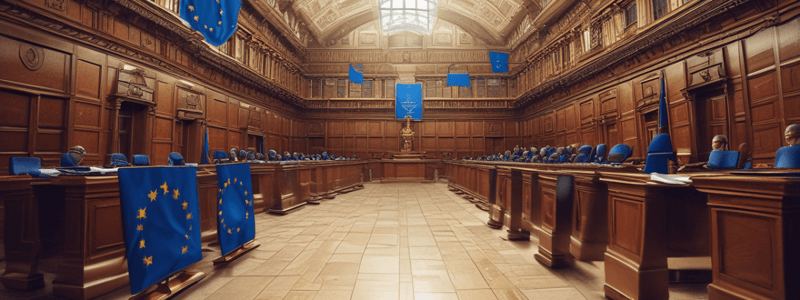Podcast
Questions and Answers
What happens if the Council rejects the Commission's proposal?
What happens if the Council rejects the Commission's proposal?
- The proposal is rejected and cannot be revived
- The proposal is sent back to the Commission for revision (correct)
- The proposal is adopted as is by the Council
- The proposal is sent to the Parliament for a Second Reading
What is the role of the committee during the First Reading?
What is the role of the committee during the First Reading?
- To amend the Commission's proposal
- To study the Commission's proposal and prepare a report (correct)
- To reject the Commission's proposal
- To approve the Commission's proposal
What happens during the Conciliation Stage?
What happens during the Conciliation Stage?
- The Council and Parliament try to reach an agreement on the proposal (correct)
- The proposal is sent to the European Council for approval
- The Commission revises the proposal based on Council's feedback
- The Parliament votes on the proposal
What is the role of the trilogue during the legislative process?
What is the role of the trilogue during the legislative process?
What happens after the Conciliation Stage?
What happens after the Conciliation Stage?
What is the requirement for the Parliament to act during the First Reading?
What is the requirement for the Parliament to act during the First Reading?
What is the role of the Presidents of the Council and Parliament?
What is the role of the Presidents of the Council and Parliament?
What happens if the Parliament proposes amendments to the Council's position?
What happens if the Parliament proposes amendments to the Council's position?
Under the ordinary legislative procedure, what power does the European Parliament have?
Under the ordinary legislative procedure, what power does the European Parliament have?
What is the role of the Commission in the ordinary legislative procedure?
What is the role of the Commission in the ordinary legislative procedure?
What is the purpose of institutional checks and consultation in the ordinary legislative procedure?
What is the purpose of institutional checks and consultation in the ordinary legislative procedure?
What is the significance of Article 289 TFEU in special legislative procedures?
What is the significance of Article 289 TFEU in special legislative procedures?
In special legislative procedures, what is the role of the European Parliament?
In special legislative procedures, what is the role of the European Parliament?
What is the significance of the principle of conferral in the ordinary legislative procedure?
What is the significance of the principle of conferral in the ordinary legislative procedure?
What is the significance of Article 294 in the ordinary legislative procedure?
What is the significance of Article 294 in the ordinary legislative procedure?
What is the role of the Council in special legislative procedures?
What is the role of the Council in special legislative procedures?
What is the main purpose of enhanced cooperation?
What is the main purpose of enhanced cooperation?
How many member states are needed to establish enhanced cooperation?
How many member states are needed to establish enhanced cooperation?
What is the role of the European Commission in enhanced cooperation?
What is the role of the European Commission in enhanced cooperation?
What happens to member states that do not participate in enhanced cooperation?
What happens to member states that do not participate in enhanced cooperation?
What is the criteria for objectives that can be achieved through enhanced cooperation?
What is the criteria for objectives that can be achieved through enhanced cooperation?
What is the purpose of the Council in enhanced cooperation?
What is the purpose of the Council in enhanced cooperation?
What is the relationship between enhanced cooperation and the EU institutional framework?
What is the relationship between enhanced cooperation and the EU institutional framework?
What is the main difference between enhanced cooperation and other decision-making procedures?
What is the main difference between enhanced cooperation and other decision-making procedures?
What is the next step after the Conference of Presidents gives approval?
What is the next step after the Conference of Presidents gives approval?
What is the role of the Commission in the legislative process?
What is the role of the Commission in the legislative process?
What happens to the amended proposal after it is sent back to the Council?
What happens to the amended proposal after it is sent back to the Council?
What is the requirement for the Council to act on the proposal?
What is the requirement for the Council to act on the proposal?
What is the final step in the legislative process?
What is the final step in the legislative process?
What is the role of the Committee in the legislative process?
What is the role of the Committee in the legislative process?
What happens to the proposal after the Commission makes it?
What happens to the proposal after the Commission makes it?
What is the primary consequence of the EP's rejection of a proposal under the Special Legislative Procedure of Consent?
What is the primary consequence of the EP's rejection of a proposal under the Special Legislative Procedure of Consent?
What is the outcome if the Council approves the proposal?
What is the outcome if the Council approves the proposal?
Which of the following issues is NOT typically addressed through the Special Legislative Procedure of Consent?
Which of the following issues is NOT typically addressed through the Special Legislative Procedure of Consent?
What is the role of the EP in the Special Legislative Procedure of Consultation?
What is the role of the EP in the Special Legislative Procedure of Consultation?
What is the consequence if the Council does not wait for the EP's position in the Special Legislative Procedure of Consultation?
What is the consequence if the Council does not wait for the EP's position in the Special Legislative Procedure of Consultation?
In which of the following areas is the Special Legislative Procedure of Consultation typically used?
In which of the following areas is the Special Legislative Procedure of Consultation typically used?
What is the relationship between the Council and the EP in the Special Legislative Procedure of Consultation?
What is the relationship between the Council and the EP in the Special Legislative Procedure of Consultation?
What is the main difference between the Special Legislative Procedures of Consent and Consultation?
What is the main difference between the Special Legislative Procedures of Consent and Consultation?
What is the purpose of the Special Legislative Procedure of Consent?
What is the purpose of the Special Legislative Procedure of Consent?
Flashcards are hidden until you start studying
Study Notes
Ordinary Legislative Procedure
- The Commission submits a proposal to the Parliament, which acts by a majority of votes cast.
- The Council has three choices: approve the Parliament's position, reject it, or propose amendments.
- The Parliament may propose amendments to the Council's amendments.
Stages of Ordinary Legislative Procedure
- First Reading: The Commission's proposal goes to the Parliament, which acts by a majority of votes cast.
- Second Reading: The Council has three choices: approve the Parliament's position, reject it, or propose amendments.
- Conciliation Stage: A committee is delegated to draft a joint text to try to create a text that both Parliament and Council agree on.
Power Dynamics
- The European Parliament (EP) has functional veto/co-decision power under Article 294 TFEU.
- EP amendments rarely significantly alter the Commission's proposal, and significant discussion occurs beforehand and during the process.
- The Commission also has significant powers under Article 294 procedure, can withdraw and submit a modified version, but this is not a veto power.
Special Legislative Procedures
- Applies in specific cases provided by the Treaties.
- The Council adopts legislation initiated by the Commission.
- The European Parliament consents or is consulted.
Consent
- The European Parliament rejects or accepts a proposal, but cannot make amendments.
- Sensitive issues include additions to citizens' rights, establishment of a European Public Prosecutor, aspects of EU finances, and creation of a uniform method of electing MEPs.
- Rejection by the European Parliament equals a veto of the proposal.
Consultation
- Special legislative procedure may stipulate European Parliament consultation in a limited number of policy areas, such as internal market exemptions, competition law, financial matters, intellectual property, and administrative issues.
- The Council must wait for the European Parliament's position, and if it doesn't, the measure can be annulled.
- The European Parliament can approve, reject, or suggest amendments to a proposal.
Other Decision-Making Procedures
Enhanced Cooperation (Article 20 TEU)
- A last resort when the EU as a whole cannot obtain certain objectives within a reasonable period of time.
- Minimum of 9 Member States needed to establish enhanced cooperation.
- Open to all other Member States to join later on if they wish.
Establishing Enhanced Cooperation
- Member States intending to establish enhanced cooperation address a request to the Commission, which may submit a proposal to the Council.
- The European Parliament Committee makes clear its intention to put forward an own-initiative report.
- The Conference of Presidents gives approval, and the Committee writes a report outlining the legal basis, desired content of the legislative proposal, and budgetary implications.
Studying That Suits You
Use AI to generate personalized quizzes and flashcards to suit your learning preferences.




